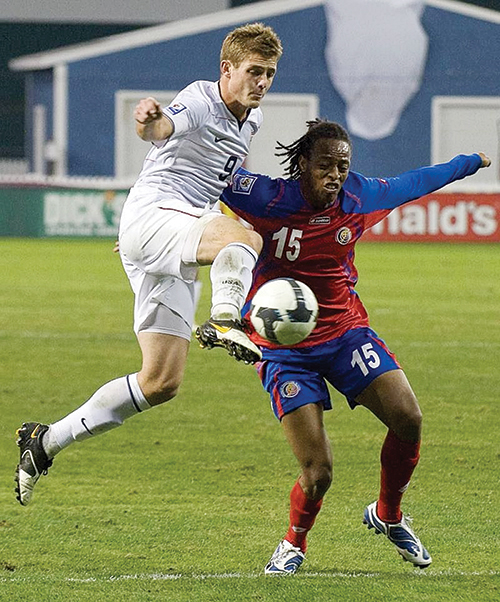Feb. 12, 2013, very nearly became a historic day for this generation of sports fans, on par with some of the most important moments on the long road toward acceptance for athletes both on the field of play and in the locker room.
Basement Notes: Robbie Rogers

Feb. 12, 2013, very nearly became a historic day for this generation of sports fans, on par with some of the most important moments on the long road toward acceptance for athletes both on the field of play and in the locker room.
When soccer player Robbie Rogers came out of the closet that day on his personal blog, it seemed as though we were finally on our way to breaking down the last major barrier of prejudice in professional sports. Later on in the same post, however, Rogers announced his simultaneous retirement from soccer.
I thought about Rogers again on Monday, when Major League Baseball paid homage to Jackie Robinson on the anniversary of his first appearance for the Brooklyn Dodgers on Opening Day in 1947. Players on every team in the majors donned Robinson’s number, 42, in what has become an annual tribute to the infielder’s contributions to the racial integration of the sport of baseball.
Around this time each year, plenty of words are written lamenting our departure from a time when athletes were activists. The people making these arguments tend to long wistfully for a time when ballplayers and boxers used their status as transcendent celebrities to petition for the important causes of their eras. They pine for an athlete who exhibits the cool grace of Robinson in the face of daunting racial backlash. They yearn for the next Muhammad Ali, who sacrificed the prime of his career to remain true to a personal principle. They wonder who might become the next Tommie Smith or John Carlos, whose upraised and black-gloved fists on the Olympic podium at the 1968 games protested a nation that would honor their achievements on foreign soil but deny them their basic rights at home.
Sports offer a unique platform that captivates billions around the globe. But this captivation has led to increasing stakes. The athletes of past decades had more to gain from their principles than they had to lose, at least in terms of their paychecks. Robinson made $5,000 in his debut season with the Dodgers; his highest salary, in 1952, was $39,750, which, adjusted for inflation, is equivalent to less than $350,000 today. The elite athlete of yesteryear made decent money, but the exponential growth of salaries around the world has made the consequences of speaking one’s mind perilous in its own way.
These days, you are much more likely to find an athlete who has been media-coached to the point of inanity than one who truly stands up for a principle. Sound bites drift into cliche as a matter of routine—rare is the athlete who is willing to risk millions of dollars in wages and millions more in potential endorsements to champion a cause, however important it may be. Peeling back the facade of one’s professional identity to reveal the true nature of the person underneath can mean financial suicide over the long run. Few athletes are prepared to take that chance.
Activists like the NFL’s Chris Kluwe and Brendon Ayanbadejo have been outspoken in recent years about the need for greater equality for the lesbian, gay, bisexual and transgender community. But neither of these men are members of that community, which provides a measure of detachment from their activism. This is why Ayanbadejo’s announcement two weeks ago that he was in discussions with four active NFL players about jointly revealing their homosexuality caused such a stir. Even after the former Baltimore Raven backtracked from his earlier statements over the following days, speculation continued as to who might be the man (or men) to finally shed their silence and make such a revelation.
Robinson couldn’t hide the color of his skin; he did not have the opportunity to avoid the brunt of the prejudices leveled at him. But Robinson’s legacy endures not only because of his skin color but because he was willing to use his platform as a famous athlete to positive effect. He confronted prejudice directly by refusing to yield to the influence of those who opposed his place on the field, and our country is better for his example of grace and dignity.
Though Rogers may not be the man destined to confront the cloud of homophobia hovering over sports and our society, his actions have brought us that much closer to achieving that goal. There is no doubt that it should have happened long before now. But it will happen. It’s only a matter of time.





